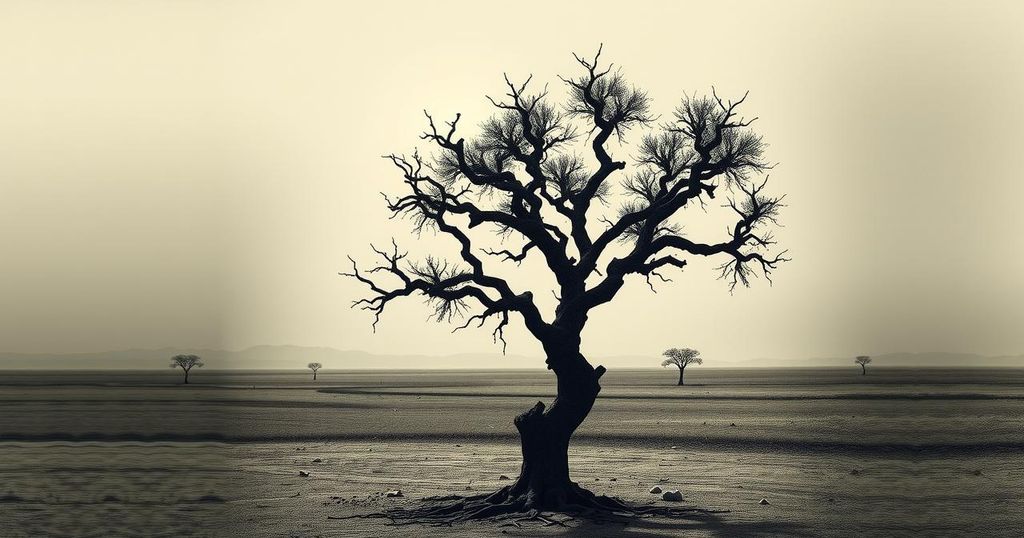Civilians in eastern Congo are torn between seeking safety amidst a chaotic army or fleeing to Rwanda, where suspicions of rebel support persist. Over 1,200 individuals have sought refuge in Rwanda, facing uncertainty as the M23 rebels advance. The situation raises systemic issues regarding regional stability, trust, and the influence of external actors like Rwanda, as humanitarian needs expand amid escalating violence.
In the escalating rebellion in eastern Congo, civilians confront a dire dilemma: retreat into the safety of the interior, relying on a disorganized army, or flee to Rwanda, a country accused of supporting the rebels. This unsettling choice follows the M23 rebel group’s recent advance, which has raised serious concerns about the lack of protection for the populace amid a rekindled conflict stretching from Congo’s capital to the Rwandan border.
Over 1,200 people have sought refuge in Rwanda since rebels seized Goma, the region’s largest city. The situation highlights widespread distrust, as expressed by a civilian named Imani Zawadi, who remarked, “On one hand, you have a foreign force that you cannot trust fully. On another side, you have a weaker army, corrupt… So, you have nobody to trust.” Many fear that the M23 will use Goma as a buffer zone while pursuing territorial gains in a resource-rich region.
Despite support from a U.N. peacekeeping force and neighboring African troops, the Congolese army is struggling against the M23’s advances, which echo past conflicts where the rebel group also captured Goma. Rwanda claims it is acting to protect ethnic Tutsis in Congo, raising suspicions of its involvement in supporting the rebel advance, which threatens the already fragile stability of eastern Congo.
Rwandan President Paul Kagame expressed concerns over the ongoing violence and the threat posed by armed groups, insisting that negotiations regarding the M23 should address the security of Congolese Tutsis. Congolese President Felix Tshisekedi faces pressure, as the seizure of Goma has resulted in demonstrations against perceived inaction from the international community. There are fears that Rwandan oversight might become a solution offered amid the chaos, a narrative rejected by many Congolese citizens.
While the Rwandan government presented itself as a refuge for fleeing Congolese, testimonies revealed reluctance and resentment from those forced to cross the border. Humanitarian conditions worsen as Goma, previously a hub for assistance, now presents uncertain futures for its inhabitants. The U.N. reports that approximately 400,000 people were displaced before the recent rebel takeover, leaving many without safe havens amid ongoing violent confrontations.
Goma’s status as a pivotal city for humanitarian support is now jeopardized, as more families become unwilling hostages to the ongoing conflict. The dire circumstances reflect the urgent need for a concerted international response to halt the violence and provide support to the affected inhabitants.
The Democratic Republic of Congo has experienced long-standing tensions fueled by various rebel groups, notably the M23, which has recently renewed military advances. Civilians often find themselves trapped between conflicting armies and limited options for safety. The implications of these rebellions extend beyond security concerns, involving the complex interplay of regional politics and longstanding grievances rooted in the ethnic composition of eastern Congo. As external influences, such as Rwanda’s alleged military support for the M23, come to light, the stakes for the affected populations become increasingly dire, leading to extensive humanitarian crises.
The current situation in eastern Congo embodies the tragic realities faced by civilians caught in the crossfire of a rekindled rebellion. With options limited to retreating into the interior or fleeing to a neighboring nation accused of supporting their adversaries, they continue to experience a profound state of insecurity. The international community’s role in addressing these challenges is crucial, as stabilizing the region will not only require military solutions but also a commitment to improving humanitarian conditions for those affected by decades of conflict.
Original Source: apnews.com




